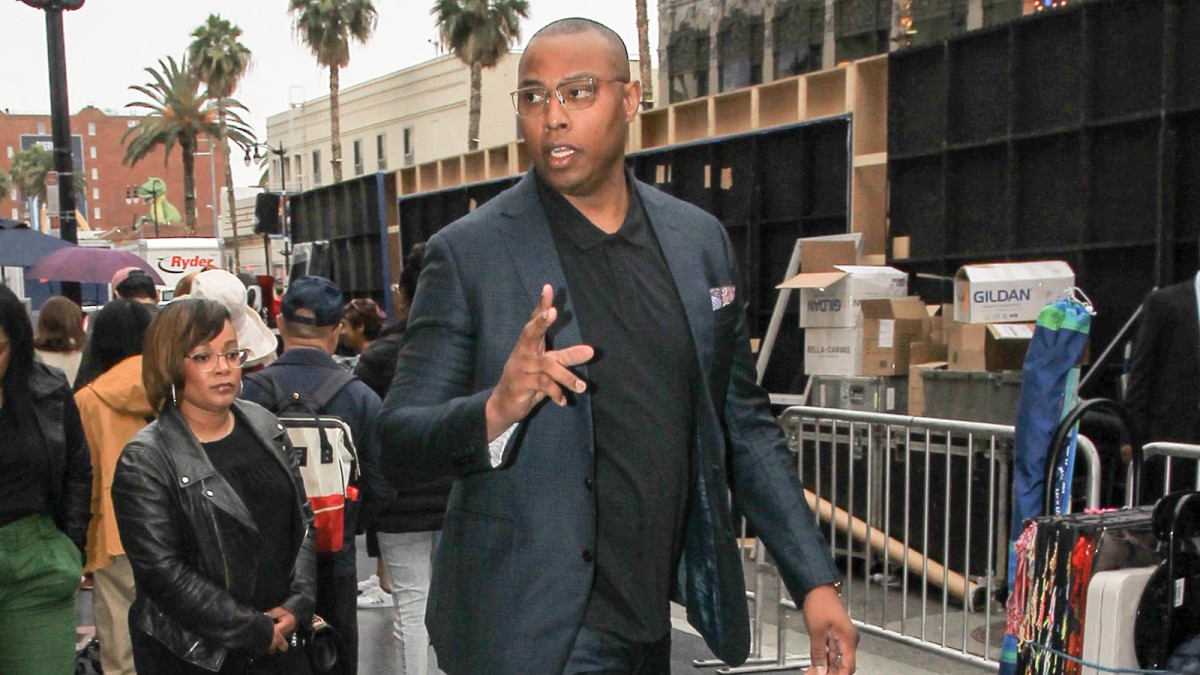Caron Butler Q&A: Hanging with Mark Wahlberg, Kicking Mountain Dew Habit, and More


Caron Butler has a case to be the most interesting man to ever play in the NBA. He played for nine teams in his 14-year career, crossing paths with Dwyane Wade, Kobe Bryant, Gilbert Arenas, and Kevin Durant and Russell Westbrook in the process. (Though injured during the playoffs, he even won a championship with Dirk Nowitzki and the Mavs in 2011.) And that’s simply his professional career.
Before the age of 15, Butler was arrested 15 times before eventually finding himself in a maximum-security detention center. Basketball became his escape, and he played for Jim Calhoun at UConn before embarking on his NBA journey. In retirement, Butler has remained busy, investing in various businesses (like Burger King franchises) or appearing on TV, sometimes with his fake hair. His latest endeavor is the HiStudios Original podcast Tuff Juice, in which Butler interviews people across the entertainment spectrum about their own paths to success.
“It’s an opportunity to shed light about a lot of situations in life.” Butler told Sports Illustrated over the phone earlier this week. “It’s not just basketball. It’s people from different walks of life that give you a chance to inspire, to encourage people to be the best possible version of themselves. People think that because of social media everything is picture perfect, insta-this and insta-that. And I want people to know it’s not a microwave-success society. You have to get the door slammed in your face. You have to pivot and start stuff over.”
In his conversation with SI, Butler reflected on his own journey to where he is now, discussed his now-dormant addiction to Mountain Dew, explained his friendship with Mark Wahlberg, and much, much more.
SI: When you think about where you were at 15, could you have ever imagined being at the place you are in life right now?
Butler: No. That’s why one, I don’t take anything for granted and understand that I’m blessed. I try to be the best possible version of myself and try to inspire people as much as possible. I always remember those humble beginnings. I always remember the adversity that I went through and I remember those challenges and keep them close to me.
SI: I wanted to ask you something I read about your past—are you still addicted to Mountain Dew?
Butler: Oh, no. Far from it. I’ve been off of it for a long, long time. Pivoted to another space where I’m trying to eat healthier, drink healthier, live a healthier lifestyle. The same way you look at financial literacy, the way you want to pass on the generational wealth and riches to your family, that also means habits. You want to pass on healthy habits. My wife and I pride ourselves on passing on healthy habits to our kids.
SI: How hard was it to stop, though?
Butler: Oh, it was crazy. I still have withdrawals. When I pass by some of those things, I just be like, “Wow.” Like, damn. I want to gravitate toward it still. But I police myself.
SI: I also read you used to chew on straws throughout your career. Do you still do that?
Butler: Yeah, that’s crazy, so I still do find myself chewing on straws. I’m an LA resident, so in California all the straws are no longer plastic, they’re paper, so that’s been an adjustment for me. I’m running out of inventory, if you know what I mean, I’m driving around and I can’t get a plastic straw that I want to.
SI: Oh, man. I had to drink a milkshake through a paper straw last night. I don’t know how they expect you to do that.
Butler: Yeah, I mean, there’s only a certain kind of straw that I really like and that’s McDonald’s straws. The texture of them. Certain straws I wouldn’t even try to dare to chew, just because there’s something about the chemicals. You have to be a straw chewer to understand where I’m coming from, but like, the chemicals on the straw you can taste when you’re chewing them. I stopped doing that years ago, some of the 7-Eleven straws and stuff like that. But the McDonald’s straws are a little different.
SI: Have you ever chewed a Capri Sun straw?
Butler: No, I have not.
SI: I think you would like it. It’s very skinny, it’s the closest to a toothpick. It’s very underrated in this conversation.
Butler: [Laughs] I never tried it.
SI: So Mark Wahlberg is producing a movie about your life, I understand you met him at a Clippers game. Do you have an ongoing relationship with Mark Wahlberg? Could you text him right now?
Butler: I could FaceTime him right now. I spend a lot of time with Mark, especially with the project going on. Whenever he’s home, we always try to get together with our families, celebrate birthdays, holidays. It’s grown beyond a business relationship to a friendship. That’s what you want in this business. You’re trying to work on something bigger than yourself, hopefully inspire others, that connection is important. It just organically happened. We just continue to build on it. I always appreciate Mark for what he’s done. He’s been an awesome friend and just a great guy all around.
SI: The Mark Wahlberg we know is the action star who is waking up at 4 a.m. to workout every day. Is he really that intense in real life?
Butler: Yeah, I mean, I’ve spent a lot of time with him at the 4 a.m. workouts, working out with him, he and Jimmy Butler, and so many other guys participate in that space. He’s just a great person, and he promotes fitness amongst his friends and people that he loves. He always encourages us to be the best version of ourselves. I love guys like that.
SI: Do you know who you would like to play you in the Caron Butler story?
Butler: That’s a great question. The guy that I really like to play me in my biopic is Jacob Latimore. I really like Jacob for various reasons. He’s from the Midwest region. He’s in a show called The Chi which is one of my favorite shows. What he embodies on that set, he made me take notice of him. Someone like that would be a great get for us.
SI: I think when people think of your NBA career, they mostly remember your time on the Wizards. Does it ever bother you when people think of that team now, they mostly remember all the anciliarry stuff?
Butler: Yeah, I just think that we could have been so much better if we would have stayed together for some more time. It was cut short. We had a fire sale and the team was broken up. I think the teams that are extremely successful, they’re successful because they had a chance to make mistakes together and continue to grow. We could have done something special together but we had so many injuries. Our best player, our franchise player, had a horrific injury. Gilbert Arenas had the knee surgeries. I myself had injuries, and the timing. And then the fire sale of the team. It was tough.
SI: How difficult was it for you not being able to play during the 2011 playoffs?
Butler: You know what? I think it was maybe harder for my fan base or something than it was for me, because I was still in it. I think that when you work so hard to accomplish a goal or dream, your journey is about sacrifices. When we got together in the preseason and set our goal to win a championship, we know injuries would be a part of it. Whether you’re on the court or on the sidelines, you buy in to the bigger vision. Instead of being able to be out there and be the second-leading scorer, I had to be the biggest picker upper. I had to know my teammates. I had to be on the sidelines telling guys what to look out for and this is the defense. It kept me in a good place and kept me in it. Mentally, I worked harder on the sidelines than I ever worked on the basketball court during that championship run. My teammates saw that, and that was the way I showed my value and was an asset to that team. I never let my injury take my leadership away, and that’s the most important thing to buying in to something bigger than yourself.
SI: What’s been the most rewarding part of your life in retirement?
Butler: Being with my kids, and my kids being able to hear everything in real time and watch everything develop. Teaching them work ethic. If you want something in life, you got to work hard for it. They’ve been watching in real time how hard you have to work to be successful. I never wanted to be someone who made a ton of money and disappeared, and my kids never really saw the labor that went into creating something bigger than yourself. My family comes from Columbus, Miss. They worked their ass off on cotton fields. My grandmother migrated up north. My uncles, they all rode up to Wisconsin in a Cadillac that I still own, and they taught me to believe me in something, in ownership, in working hard, and I want to show those same things to my kids.
SI: Okay, so one of my best friends is from Wisconsin and in college, we would love to go to Culver’s. Did you ever go there growing up? What was your go-to order?
Butler: So it’s crazy you say that. Culver’s is one of the spots, and one of the other’s is O and H. That’s like the rivalry. I used to always go to O&H instead of Culver’s. That’s a Midwest thing. People used to always battle about that. All right, you want Culver’s or O&H? I said, I’m going to O&H. I was just a white bread at O&H.
